Human Resource Management: Sustainable Expatriation in MNEs Context
VerifiedAdded on 2023/06/14
|13
|3569
|116
Essay
AI Summary
This essay provides an in-depth analysis of sustainable expatriation management, defining it as a complex topic involving interpersonal skills, human resource management, and multi-cultural communication. It discusses the process through which multinational enterprises (MNEs) develop sustainable expatriation management, emphasizing the importance of proper employment relations and the various roles expatriates play, such as agents of direct control, socialization, network builders, boundary spanners, and knowledge transfer nodes. The essay also highlights the different types of expatriate assignments, including short-term, extended, long-term, and commuter assignments. Furthermore, it explores how MNEs develop sustainable expatriation management through training, cross-cultural competence, and the application of Hofstede’s cultural dimension theory, illustrating its relevance with an example of cultural adjustment challenges. The importance of expatriation management for internationalization is underscored, noting its impact on change management, strategic management, and cross-cultural communication, as well as its role in improving local market knowledge and implementing corporate quality standards.
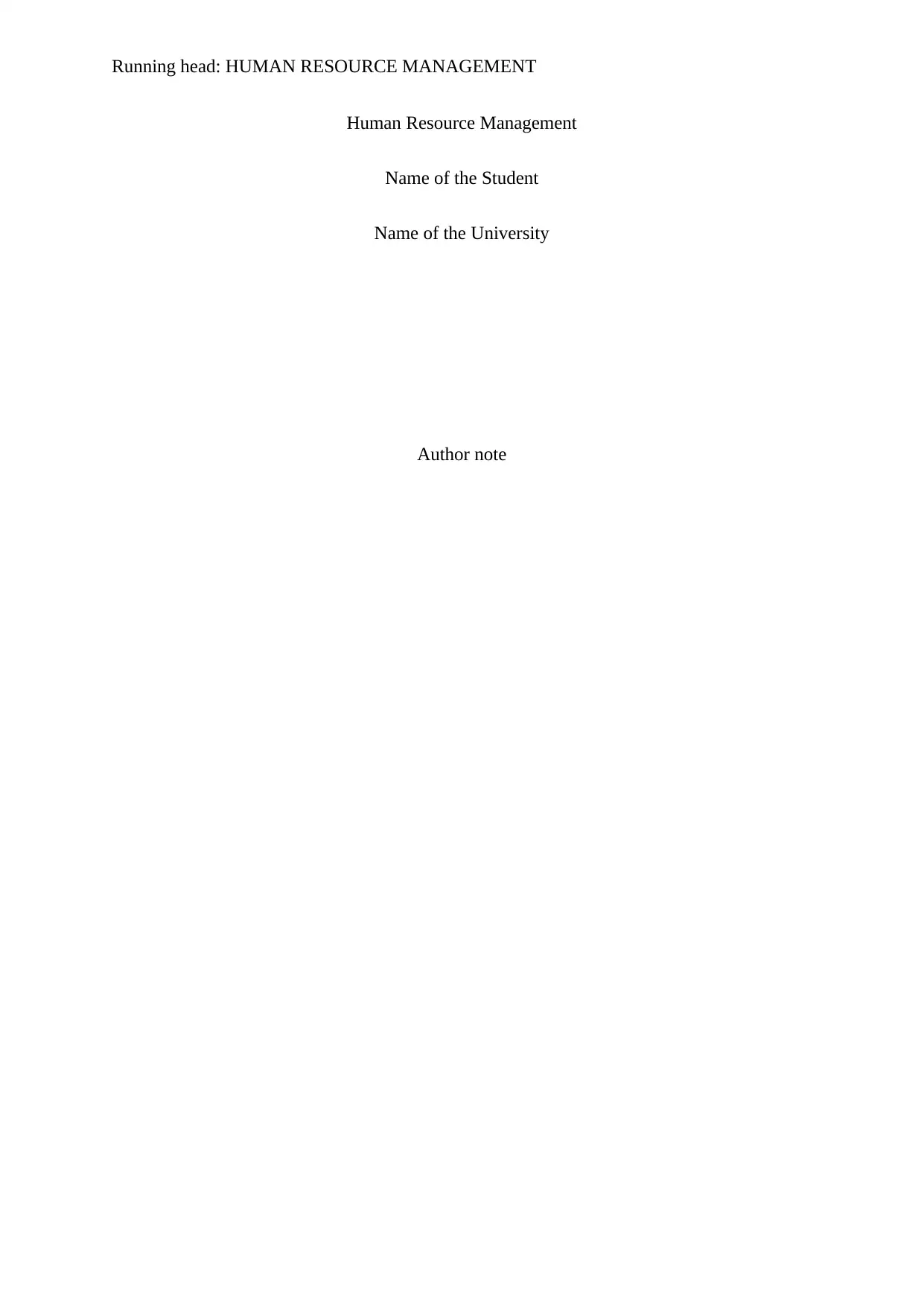
Running head: HUMAN RESOURCE MANAGEMENT
Human Resource Management
Name of the Student
Name of the University
Author note
Human Resource Management
Name of the Student
Name of the University
Author note
Paraphrase This Document
Need a fresh take? Get an instant paraphrase of this document with our AI Paraphraser
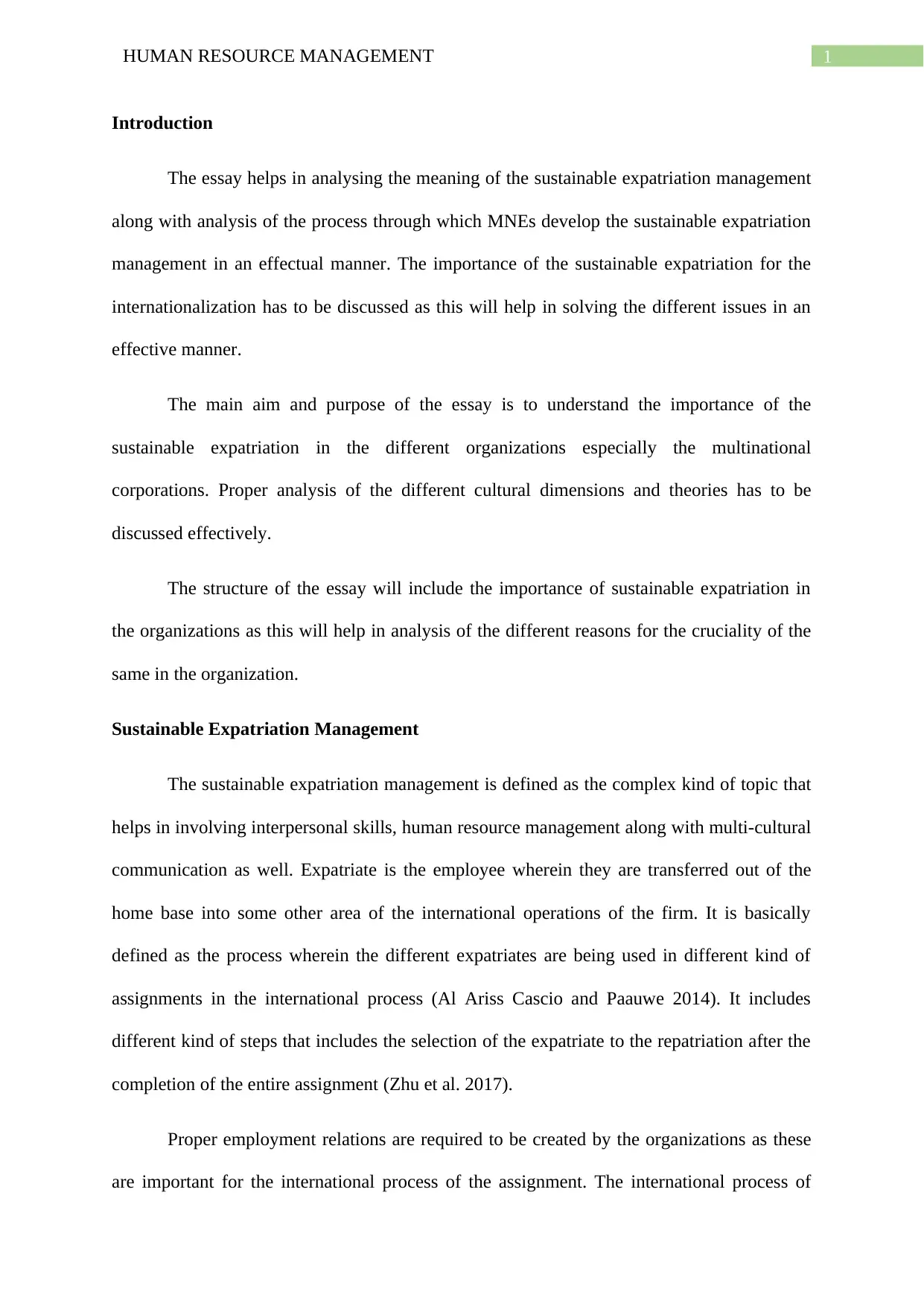
1HUMAN RESOURCE MANAGEMENT
Introduction
The essay helps in analysing the meaning of the sustainable expatriation management
along with analysis of the process through which MNEs develop the sustainable expatriation
management in an effectual manner. The importance of the sustainable expatriation for the
internationalization has to be discussed as this will help in solving the different issues in an
effective manner.
The main aim and purpose of the essay is to understand the importance of the
sustainable expatriation in the different organizations especially the multinational
corporations. Proper analysis of the different cultural dimensions and theories has to be
discussed effectively.
The structure of the essay will include the importance of sustainable expatriation in
the organizations as this will help in analysis of the different reasons for the cruciality of the
same in the organization.
Sustainable Expatriation Management
The sustainable expatriation management is defined as the complex kind of topic that
helps in involving interpersonal skills, human resource management along with multi-cultural
communication as well. Expatriate is the employee wherein they are transferred out of the
home base into some other area of the international operations of the firm. It is basically
defined as the process wherein the different expatriates are being used in different kind of
assignments in the international process (Al Ariss Cascio and Paauwe 2014). It includes
different kind of steps that includes the selection of the expatriate to the repatriation after the
completion of the entire assignment (Zhu et al. 2017).
Proper employment relations are required to be created by the organizations as these
are important for the international process of the assignment. The international process of
Introduction
The essay helps in analysing the meaning of the sustainable expatriation management
along with analysis of the process through which MNEs develop the sustainable expatriation
management in an effectual manner. The importance of the sustainable expatriation for the
internationalization has to be discussed as this will help in solving the different issues in an
effective manner.
The main aim and purpose of the essay is to understand the importance of the
sustainable expatriation in the different organizations especially the multinational
corporations. Proper analysis of the different cultural dimensions and theories has to be
discussed effectively.
The structure of the essay will include the importance of sustainable expatriation in
the organizations as this will help in analysis of the different reasons for the cruciality of the
same in the organization.
Sustainable Expatriation Management
The sustainable expatriation management is defined as the complex kind of topic that
helps in involving interpersonal skills, human resource management along with multi-cultural
communication as well. Expatriate is the employee wherein they are transferred out of the
home base into some other area of the international operations of the firm. It is basically
defined as the process wherein the different expatriates are being used in different kind of
assignments in the international process (Al Ariss Cascio and Paauwe 2014). It includes
different kind of steps that includes the selection of the expatriate to the repatriation after the
completion of the entire assignment (Zhu et al. 2017).
Proper employment relations are required to be created by the organizations as these
are important for the international process of the assignment. The international process of
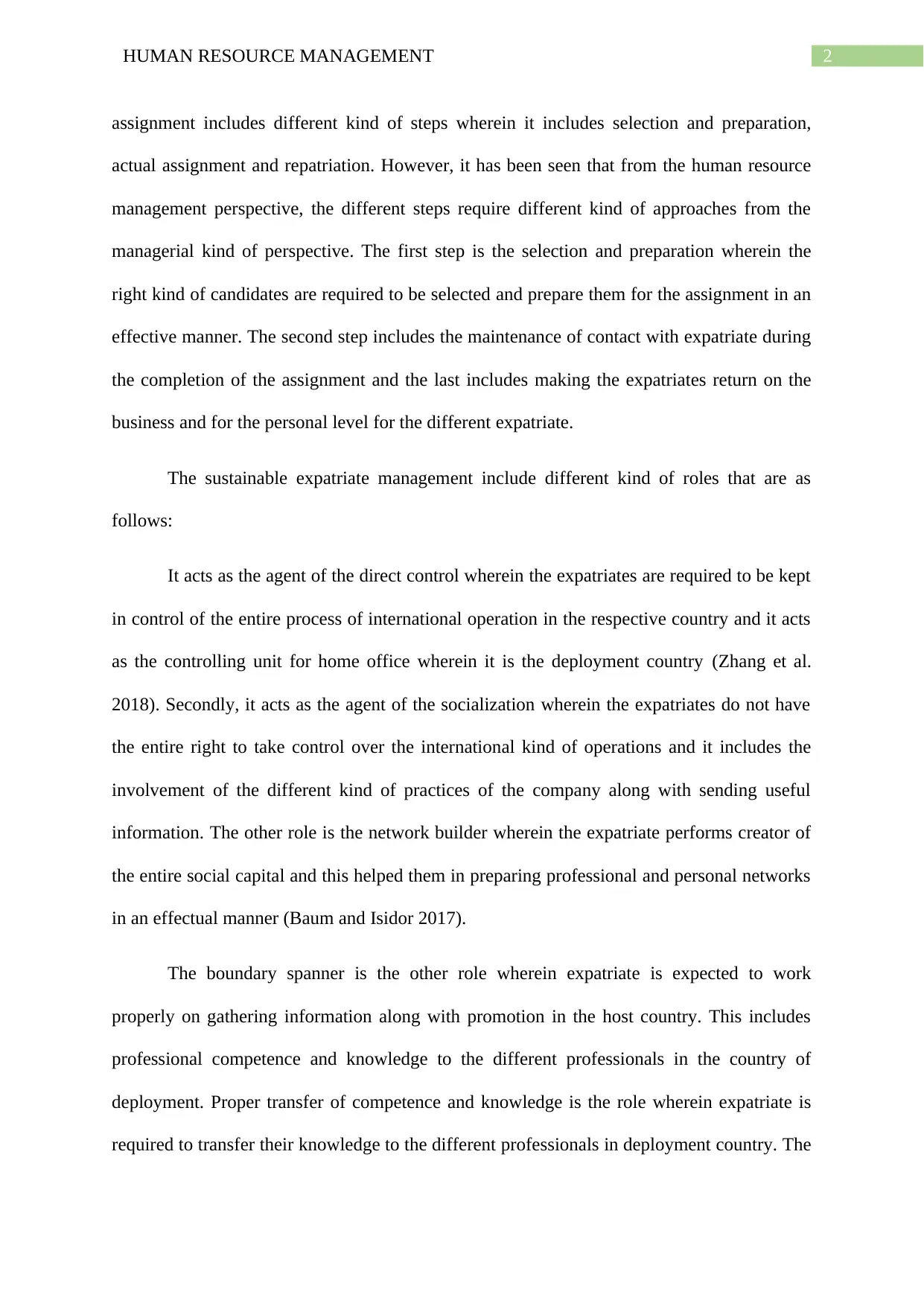
2HUMAN RESOURCE MANAGEMENT
assignment includes different kind of steps wherein it includes selection and preparation,
actual assignment and repatriation. However, it has been seen that from the human resource
management perspective, the different steps require different kind of approaches from the
managerial kind of perspective. The first step is the selection and preparation wherein the
right kind of candidates are required to be selected and prepare them for the assignment in an
effective manner. The second step includes the maintenance of contact with expatriate during
the completion of the assignment and the last includes making the expatriates return on the
business and for the personal level for the different expatriate.
The sustainable expatriate management include different kind of roles that are as
follows:
It acts as the agent of the direct control wherein the expatriates are required to be kept
in control of the entire process of international operation in the respective country and it acts
as the controlling unit for home office wherein it is the deployment country (Zhang et al.
2018). Secondly, it acts as the agent of the socialization wherein the expatriates do not have
the entire right to take control over the international kind of operations and it includes the
involvement of the different kind of practices of the company along with sending useful
information. The other role is the network builder wherein the expatriate performs creator of
the entire social capital and this helped them in preparing professional and personal networks
in an effectual manner (Baum and Isidor 2017).
The boundary spanner is the other role wherein expatriate is expected to work
properly on gathering information along with promotion in the host country. This includes
professional competence and knowledge to the different professionals in the country of
deployment. Proper transfer of competence and knowledge is the role wherein expatriate is
required to transfer their knowledge to the different professionals in deployment country. The
assignment includes different kind of steps wherein it includes selection and preparation,
actual assignment and repatriation. However, it has been seen that from the human resource
management perspective, the different steps require different kind of approaches from the
managerial kind of perspective. The first step is the selection and preparation wherein the
right kind of candidates are required to be selected and prepare them for the assignment in an
effective manner. The second step includes the maintenance of contact with expatriate during
the completion of the assignment and the last includes making the expatriates return on the
business and for the personal level for the different expatriate.
The sustainable expatriate management include different kind of roles that are as
follows:
It acts as the agent of the direct control wherein the expatriates are required to be kept
in control of the entire process of international operation in the respective country and it acts
as the controlling unit for home office wherein it is the deployment country (Zhang et al.
2018). Secondly, it acts as the agent of the socialization wherein the expatriates do not have
the entire right to take control over the international kind of operations and it includes the
involvement of the different kind of practices of the company along with sending useful
information. The other role is the network builder wherein the expatriate performs creator of
the entire social capital and this helped them in preparing professional and personal networks
in an effectual manner (Baum and Isidor 2017).
The boundary spanner is the other role wherein expatriate is expected to work
properly on gathering information along with promotion in the host country. This includes
professional competence and knowledge to the different professionals in the country of
deployment. Proper transfer of competence and knowledge is the role wherein expatriate is
required to transfer their knowledge to the different professionals in deployment country. The
⊘ This is a preview!⊘
Do you want full access?
Subscribe today to unlock all pages.

Trusted by 1+ million students worldwide
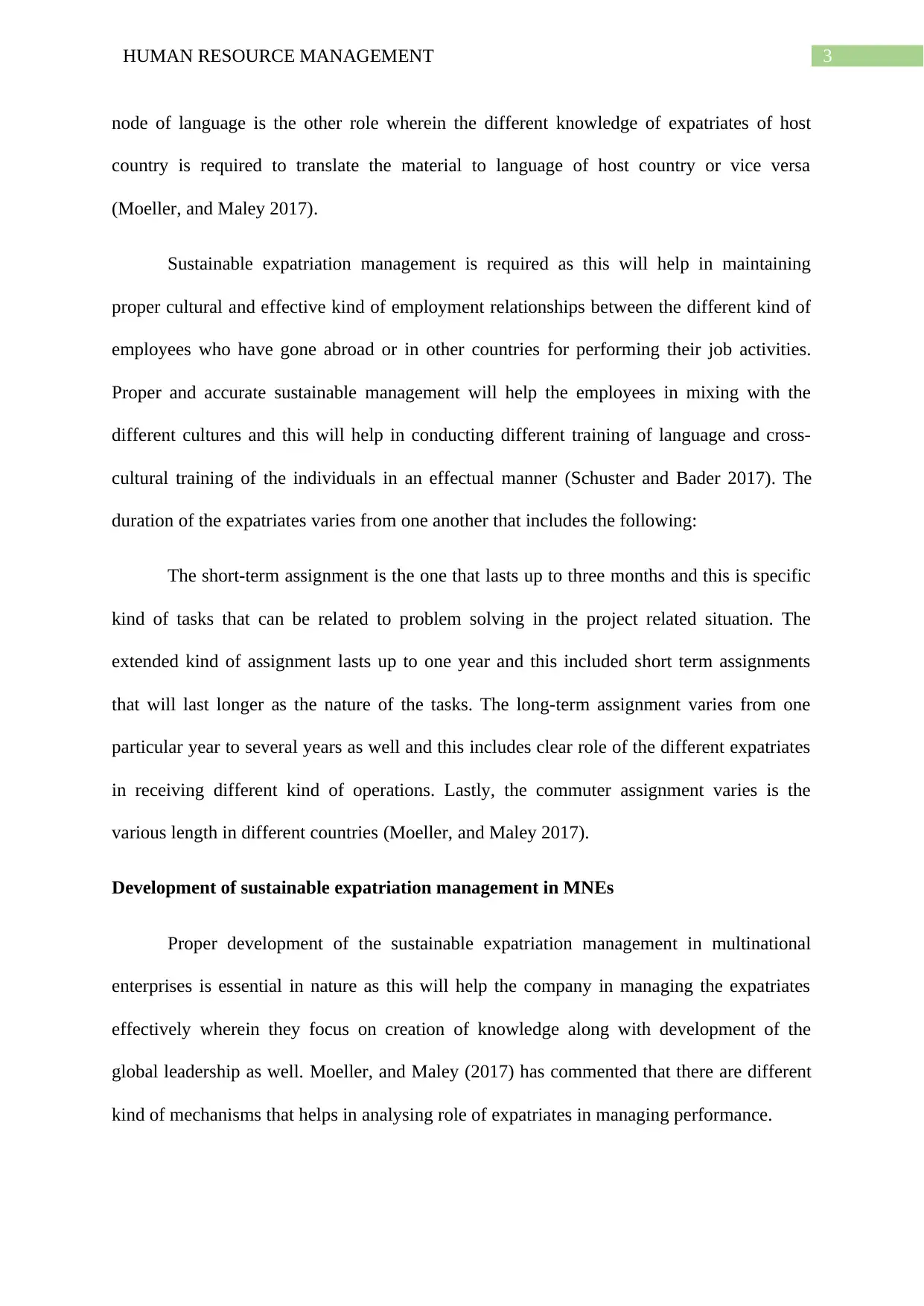
3HUMAN RESOURCE MANAGEMENT
node of language is the other role wherein the different knowledge of expatriates of host
country is required to translate the material to language of host country or vice versa
(Moeller, and Maley 2017).
Sustainable expatriation management is required as this will help in maintaining
proper cultural and effective kind of employment relationships between the different kind of
employees who have gone abroad or in other countries for performing their job activities.
Proper and accurate sustainable management will help the employees in mixing with the
different cultures and this will help in conducting different training of language and cross-
cultural training of the individuals in an effectual manner (Schuster and Bader 2017). The
duration of the expatriates varies from one another that includes the following:
The short-term assignment is the one that lasts up to three months and this is specific
kind of tasks that can be related to problem solving in the project related situation. The
extended kind of assignment lasts up to one year and this included short term assignments
that will last longer as the nature of the tasks. The long-term assignment varies from one
particular year to several years as well and this includes clear role of the different expatriates
in receiving different kind of operations. Lastly, the commuter assignment varies is the
various length in different countries (Moeller, and Maley 2017).
Development of sustainable expatriation management in MNEs
Proper development of the sustainable expatriation management in multinational
enterprises is essential in nature as this will help the company in managing the expatriates
effectively wherein they focus on creation of knowledge along with development of the
global leadership as well. Moeller, and Maley (2017) has commented that there are different
kind of mechanisms that helps in analysing role of expatriates in managing performance.
node of language is the other role wherein the different knowledge of expatriates of host
country is required to translate the material to language of host country or vice versa
(Moeller, and Maley 2017).
Sustainable expatriation management is required as this will help in maintaining
proper cultural and effective kind of employment relationships between the different kind of
employees who have gone abroad or in other countries for performing their job activities.
Proper and accurate sustainable management will help the employees in mixing with the
different cultures and this will help in conducting different training of language and cross-
cultural training of the individuals in an effectual manner (Schuster and Bader 2017). The
duration of the expatriates varies from one another that includes the following:
The short-term assignment is the one that lasts up to three months and this is specific
kind of tasks that can be related to problem solving in the project related situation. The
extended kind of assignment lasts up to one year and this included short term assignments
that will last longer as the nature of the tasks. The long-term assignment varies from one
particular year to several years as well and this includes clear role of the different expatriates
in receiving different kind of operations. Lastly, the commuter assignment varies is the
various length in different countries (Moeller, and Maley 2017).
Development of sustainable expatriation management in MNEs
Proper development of the sustainable expatriation management in multinational
enterprises is essential in nature as this will help the company in managing the expatriates
effectively wherein they focus on creation of knowledge along with development of the
global leadership as well. Moeller, and Maley (2017) has commented that there are different
kind of mechanisms that helps in analysing role of expatriates in managing performance.
Paraphrase This Document
Need a fresh take? Get an instant paraphrase of this document with our AI Paraphraser
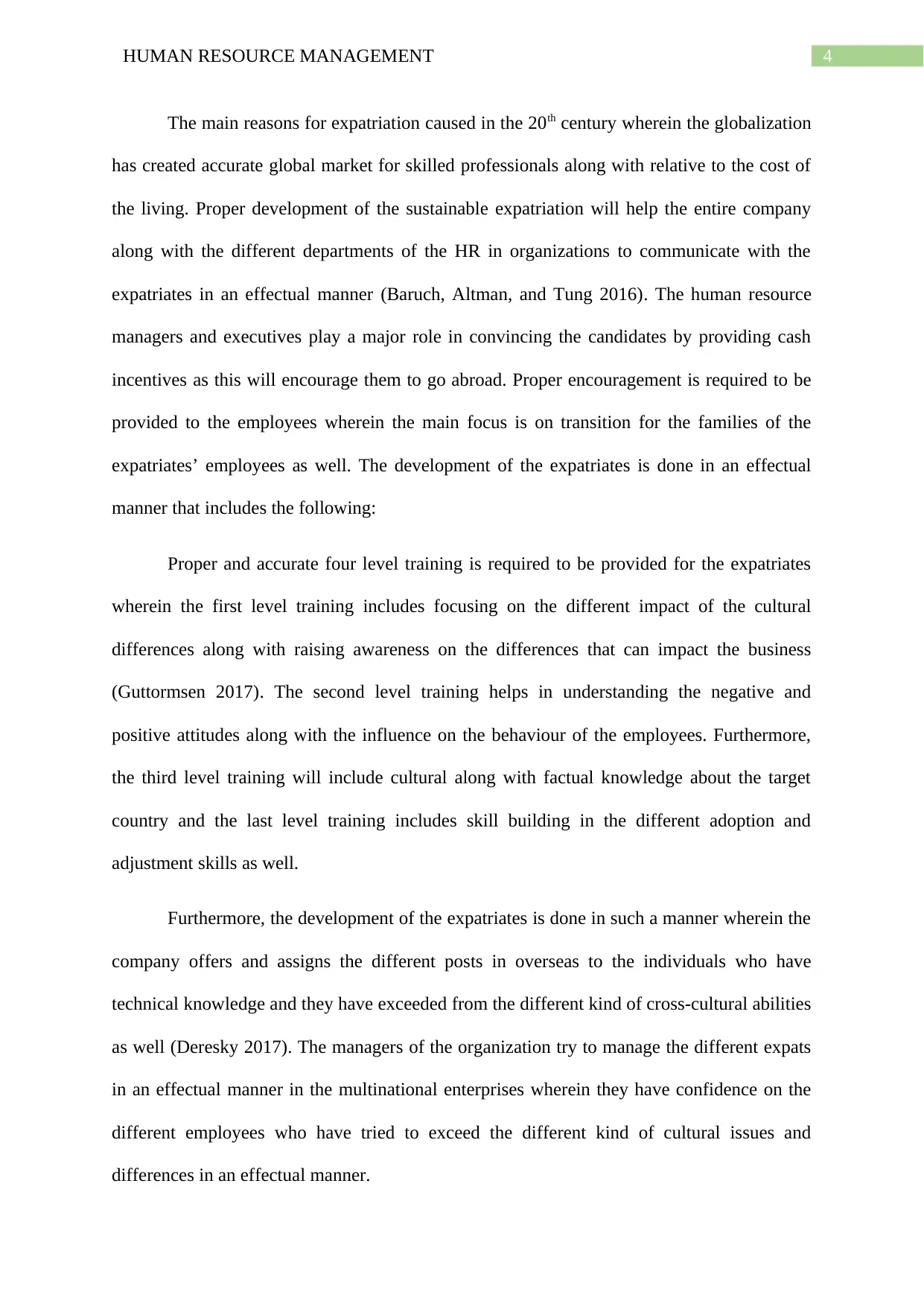
4HUMAN RESOURCE MANAGEMENT
The main reasons for expatriation caused in the 20th century wherein the globalization
has created accurate global market for skilled professionals along with relative to the cost of
the living. Proper development of the sustainable expatriation will help the entire company
along with the different departments of the HR in organizations to communicate with the
expatriates in an effectual manner (Baruch, Altman, and Tung 2016). The human resource
managers and executives play a major role in convincing the candidates by providing cash
incentives as this will encourage them to go abroad. Proper encouragement is required to be
provided to the employees wherein the main focus is on transition for the families of the
expatriates’ employees as well. The development of the expatriates is done in an effectual
manner that includes the following:
Proper and accurate four level training is required to be provided for the expatriates
wherein the first level training includes focusing on the different impact of the cultural
differences along with raising awareness on the differences that can impact the business
(Guttormsen 2017). The second level training helps in understanding the negative and
positive attitudes along with the influence on the behaviour of the employees. Furthermore,
the third level training will include cultural along with factual knowledge about the target
country and the last level training includes skill building in the different adoption and
adjustment skills as well.
Furthermore, the development of the expatriates is done in such a manner wherein the
company offers and assigns the different posts in overseas to the individuals who have
technical knowledge and they have exceeded from the different kind of cross-cultural abilities
as well (Deresky 2017). The managers of the organization try to manage the different expats
in an effectual manner in the multinational enterprises wherein they have confidence on the
different employees who have tried to exceed the different kind of cultural issues and
differences in an effectual manner.
The main reasons for expatriation caused in the 20th century wherein the globalization
has created accurate global market for skilled professionals along with relative to the cost of
the living. Proper development of the sustainable expatriation will help the entire company
along with the different departments of the HR in organizations to communicate with the
expatriates in an effectual manner (Baruch, Altman, and Tung 2016). The human resource
managers and executives play a major role in convincing the candidates by providing cash
incentives as this will encourage them to go abroad. Proper encouragement is required to be
provided to the employees wherein the main focus is on transition for the families of the
expatriates’ employees as well. The development of the expatriates is done in an effectual
manner that includes the following:
Proper and accurate four level training is required to be provided for the expatriates
wherein the first level training includes focusing on the different impact of the cultural
differences along with raising awareness on the differences that can impact the business
(Guttormsen 2017). The second level training helps in understanding the negative and
positive attitudes along with the influence on the behaviour of the employees. Furthermore,
the third level training will include cultural along with factual knowledge about the target
country and the last level training includes skill building in the different adoption and
adjustment skills as well.
Furthermore, the development of the expatriates is done in such a manner wherein the
company offers and assigns the different posts in overseas to the individuals who have
technical knowledge and they have exceeded from the different kind of cross-cultural abilities
as well (Deresky 2017). The managers of the organization try to manage the different expats
in an effectual manner in the multinational enterprises wherein they have confidence on the
different employees who have tried to exceed the different kind of cultural issues and
differences in an effectual manner.
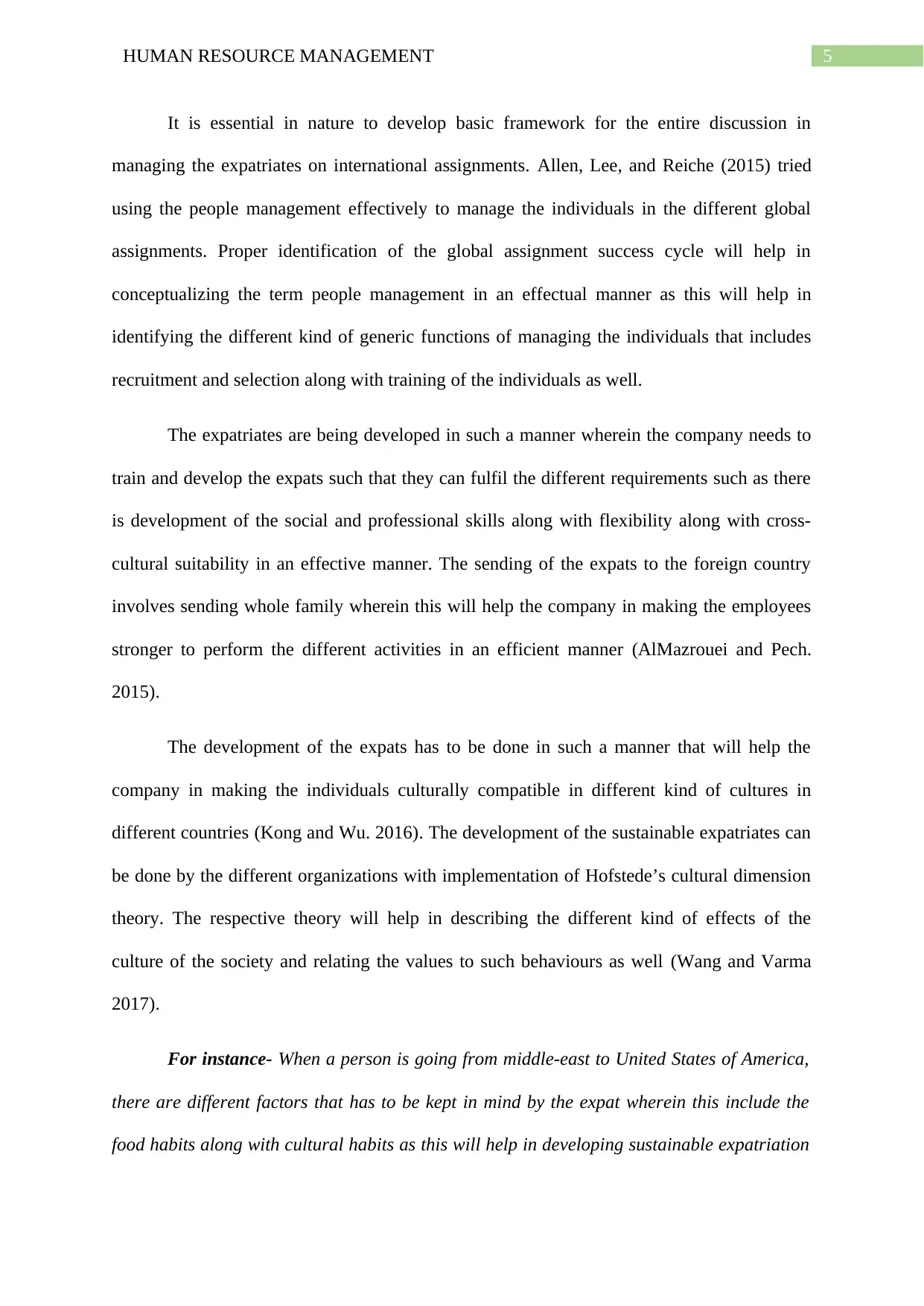
5HUMAN RESOURCE MANAGEMENT
It is essential in nature to develop basic framework for the entire discussion in
managing the expatriates on international assignments. Allen, Lee, and Reiche (2015) tried
using the people management effectively to manage the individuals in the different global
assignments. Proper identification of the global assignment success cycle will help in
conceptualizing the term people management in an effectual manner as this will help in
identifying the different kind of generic functions of managing the individuals that includes
recruitment and selection along with training of the individuals as well.
The expatriates are being developed in such a manner wherein the company needs to
train and develop the expats such that they can fulfil the different requirements such as there
is development of the social and professional skills along with flexibility along with cross-
cultural suitability in an effective manner. The sending of the expats to the foreign country
involves sending whole family wherein this will help the company in making the employees
stronger to perform the different activities in an efficient manner (AlMazrouei and Pech.
2015).
The development of the expats has to be done in such a manner that will help the
company in making the individuals culturally compatible in different kind of cultures in
different countries (Kong and Wu. 2016). The development of the sustainable expatriates can
be done by the different organizations with implementation of Hofstede’s cultural dimension
theory. The respective theory will help in describing the different kind of effects of the
culture of the society and relating the values to such behaviours as well (Wang and Varma
2017).
For instance- When a person is going from middle-east to United States of America,
there are different factors that has to be kept in mind by the expat wherein this include the
food habits along with cultural habits as this will help in developing sustainable expatriation
It is essential in nature to develop basic framework for the entire discussion in
managing the expatriates on international assignments. Allen, Lee, and Reiche (2015) tried
using the people management effectively to manage the individuals in the different global
assignments. Proper identification of the global assignment success cycle will help in
conceptualizing the term people management in an effectual manner as this will help in
identifying the different kind of generic functions of managing the individuals that includes
recruitment and selection along with training of the individuals as well.
The expatriates are being developed in such a manner wherein the company needs to
train and develop the expats such that they can fulfil the different requirements such as there
is development of the social and professional skills along with flexibility along with cross-
cultural suitability in an effective manner. The sending of the expats to the foreign country
involves sending whole family wherein this will help the company in making the employees
stronger to perform the different activities in an efficient manner (AlMazrouei and Pech.
2015).
The development of the expats has to be done in such a manner that will help the
company in making the individuals culturally compatible in different kind of cultures in
different countries (Kong and Wu. 2016). The development of the sustainable expatriates can
be done by the different organizations with implementation of Hofstede’s cultural dimension
theory. The respective theory will help in describing the different kind of effects of the
culture of the society and relating the values to such behaviours as well (Wang and Varma
2017).
For instance- When a person is going from middle-east to United States of America,
there are different factors that has to be kept in mind by the expat wherein this include the
food habits along with cultural habits as this will help in developing sustainable expatriation
⊘ This is a preview!⊘
Do you want full access?
Subscribe today to unlock all pages.

Trusted by 1+ million students worldwide
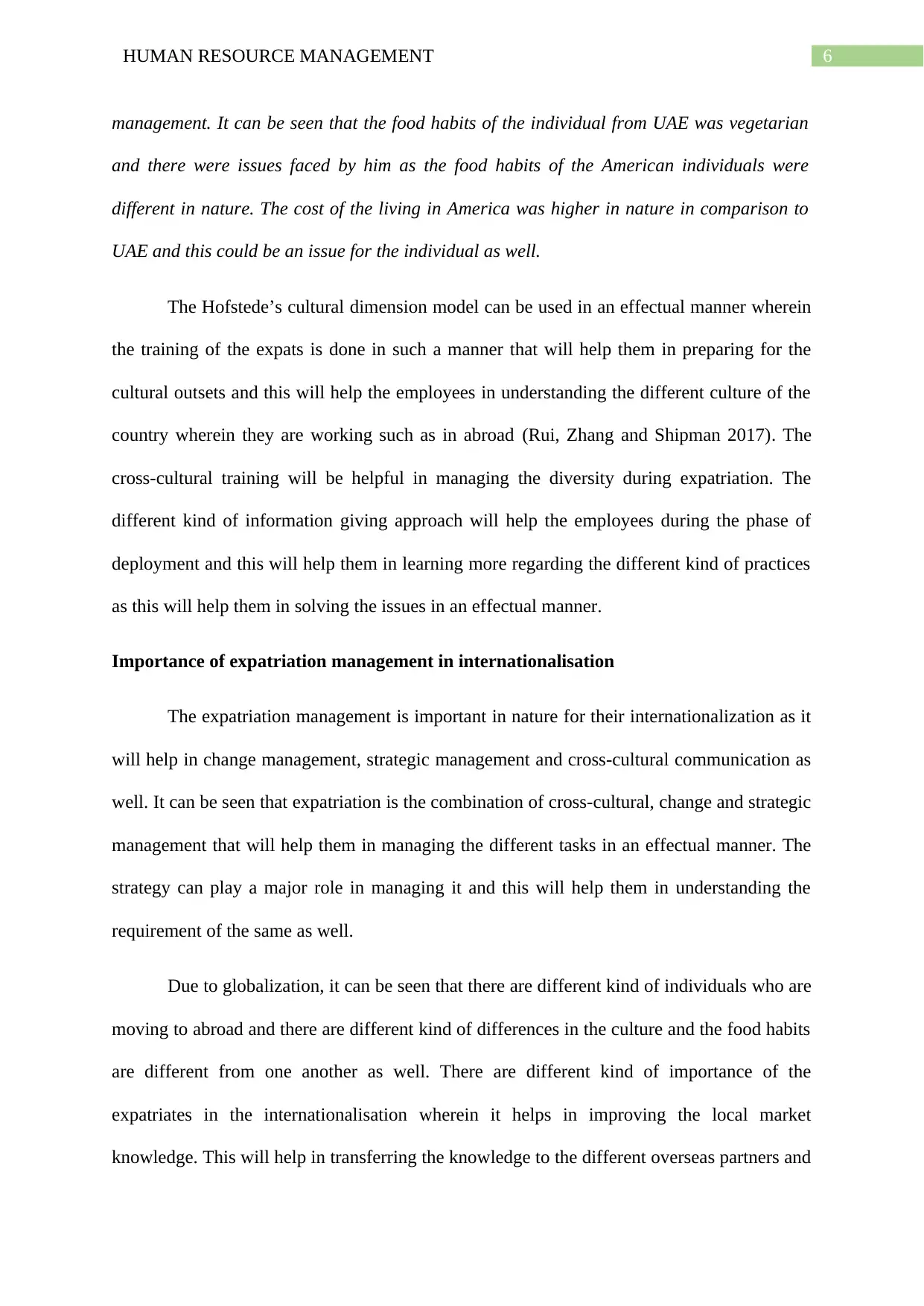
6HUMAN RESOURCE MANAGEMENT
management. It can be seen that the food habits of the individual from UAE was vegetarian
and there were issues faced by him as the food habits of the American individuals were
different in nature. The cost of the living in America was higher in nature in comparison to
UAE and this could be an issue for the individual as well.
The Hofstede’s cultural dimension model can be used in an effectual manner wherein
the training of the expats is done in such a manner that will help them in preparing for the
cultural outsets and this will help the employees in understanding the different culture of the
country wherein they are working such as in abroad (Rui, Zhang and Shipman 2017). The
cross-cultural training will be helpful in managing the diversity during expatriation. The
different kind of information giving approach will help the employees during the phase of
deployment and this will help them in learning more regarding the different kind of practices
as this will help them in solving the issues in an effectual manner.
Importance of expatriation management in internationalisation
The expatriation management is important in nature for their internationalization as it
will help in change management, strategic management and cross-cultural communication as
well. It can be seen that expatriation is the combination of cross-cultural, change and strategic
management that will help them in managing the different tasks in an effectual manner. The
strategy can play a major role in managing it and this will help them in understanding the
requirement of the same as well.
Due to globalization, it can be seen that there are different kind of individuals who are
moving to abroad and there are different kind of differences in the culture and the food habits
are different from one another as well. There are different kind of importance of the
expatriates in the internationalisation wherein it helps in improving the local market
knowledge. This will help in transferring the knowledge to the different overseas partners and
management. It can be seen that the food habits of the individual from UAE was vegetarian
and there were issues faced by him as the food habits of the American individuals were
different in nature. The cost of the living in America was higher in nature in comparison to
UAE and this could be an issue for the individual as well.
The Hofstede’s cultural dimension model can be used in an effectual manner wherein
the training of the expats is done in such a manner that will help them in preparing for the
cultural outsets and this will help the employees in understanding the different culture of the
country wherein they are working such as in abroad (Rui, Zhang and Shipman 2017). The
cross-cultural training will be helpful in managing the diversity during expatriation. The
different kind of information giving approach will help the employees during the phase of
deployment and this will help them in learning more regarding the different kind of practices
as this will help them in solving the issues in an effectual manner.
Importance of expatriation management in internationalisation
The expatriation management is important in nature for their internationalization as it
will help in change management, strategic management and cross-cultural communication as
well. It can be seen that expatriation is the combination of cross-cultural, change and strategic
management that will help them in managing the different tasks in an effectual manner. The
strategy can play a major role in managing it and this will help them in understanding the
requirement of the same as well.
Due to globalization, it can be seen that there are different kind of individuals who are
moving to abroad and there are different kind of differences in the culture and the food habits
are different from one another as well. There are different kind of importance of the
expatriates in the internationalisation wherein it helps in improving the local market
knowledge. This will help in transferring the knowledge to the different overseas partners and
Paraphrase This Document
Need a fresh take? Get an instant paraphrase of this document with our AI Paraphraser
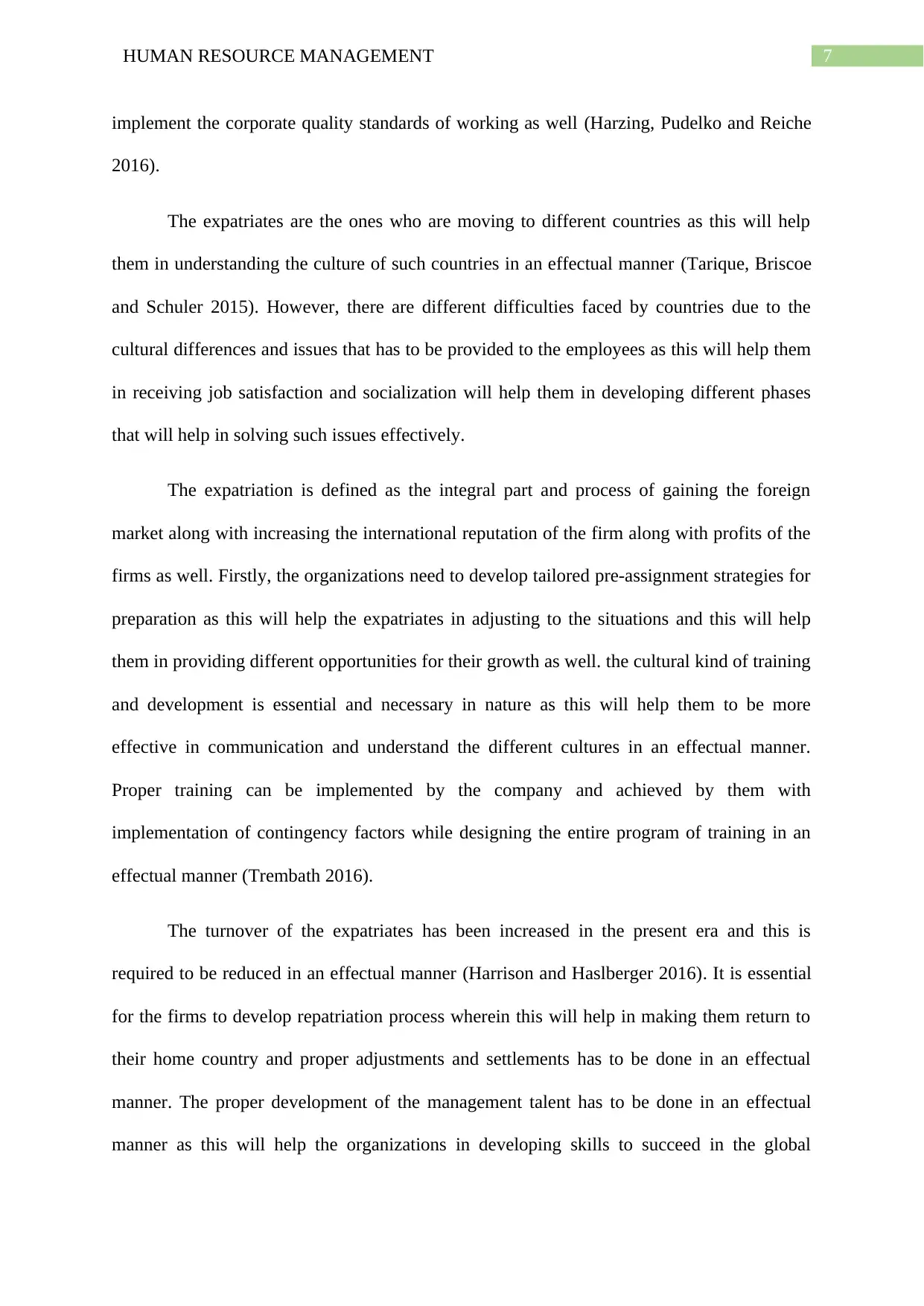
7HUMAN RESOURCE MANAGEMENT
implement the corporate quality standards of working as well (Harzing, Pudelko and Reiche
2016).
The expatriates are the ones who are moving to different countries as this will help
them in understanding the culture of such countries in an effectual manner (Tarique, Briscoe
and Schuler 2015). However, there are different difficulties faced by countries due to the
cultural differences and issues that has to be provided to the employees as this will help them
in receiving job satisfaction and socialization will help them in developing different phases
that will help in solving such issues effectively.
The expatriation is defined as the integral part and process of gaining the foreign
market along with increasing the international reputation of the firm along with profits of the
firms as well. Firstly, the organizations need to develop tailored pre-assignment strategies for
preparation as this will help the expatriates in adjusting to the situations and this will help
them in providing different opportunities for their growth as well. the cultural kind of training
and development is essential and necessary in nature as this will help them to be more
effective in communication and understand the different cultures in an effectual manner.
Proper training can be implemented by the company and achieved by them with
implementation of contingency factors while designing the entire program of training in an
effectual manner (Trembath 2016).
The turnover of the expatriates has been increased in the present era and this is
required to be reduced in an effectual manner (Harrison and Haslberger 2016). It is essential
for the firms to develop repatriation process wherein this will help in making them return to
their home country and proper adjustments and settlements has to be done in an effectual
manner. The proper development of the management talent has to be done in an effectual
manner as this will help the organizations in developing skills to succeed in the global
implement the corporate quality standards of working as well (Harzing, Pudelko and Reiche
2016).
The expatriates are the ones who are moving to different countries as this will help
them in understanding the culture of such countries in an effectual manner (Tarique, Briscoe
and Schuler 2015). However, there are different difficulties faced by countries due to the
cultural differences and issues that has to be provided to the employees as this will help them
in receiving job satisfaction and socialization will help them in developing different phases
that will help in solving such issues effectively.
The expatriation is defined as the integral part and process of gaining the foreign
market along with increasing the international reputation of the firm along with profits of the
firms as well. Firstly, the organizations need to develop tailored pre-assignment strategies for
preparation as this will help the expatriates in adjusting to the situations and this will help
them in providing different opportunities for their growth as well. the cultural kind of training
and development is essential and necessary in nature as this will help them to be more
effective in communication and understand the different cultures in an effectual manner.
Proper training can be implemented by the company and achieved by them with
implementation of contingency factors while designing the entire program of training in an
effectual manner (Trembath 2016).
The turnover of the expatriates has been increased in the present era and this is
required to be reduced in an effectual manner (Harrison and Haslberger 2016). It is essential
for the firms to develop repatriation process wherein this will help in making them return to
their home country and proper adjustments and settlements has to be done in an effectual
manner. The proper development of the management talent has to be done in an effectual
manner as this will help the organizations in developing skills to succeed in the global
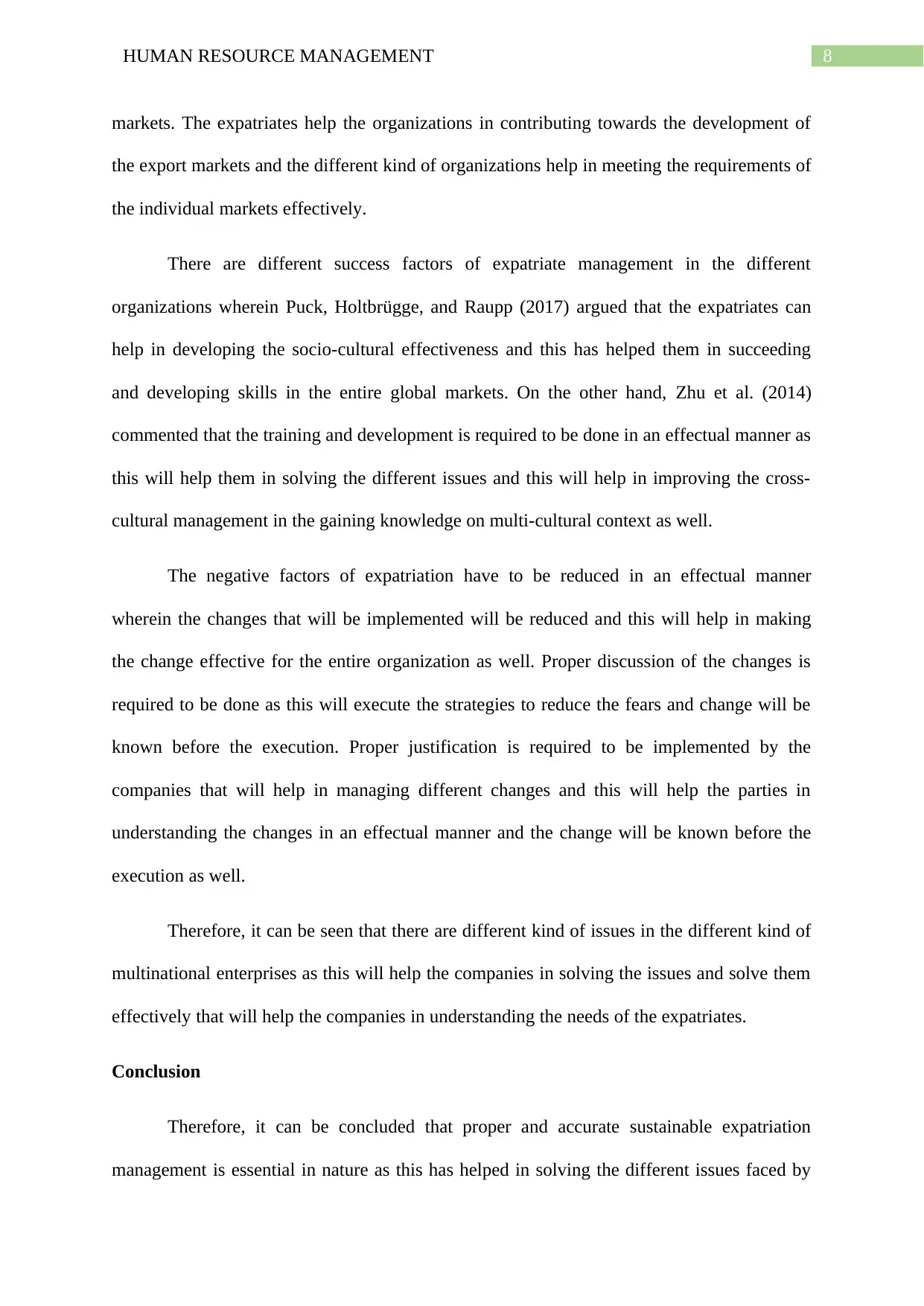
8HUMAN RESOURCE MANAGEMENT
markets. The expatriates help the organizations in contributing towards the development of
the export markets and the different kind of organizations help in meeting the requirements of
the individual markets effectively.
There are different success factors of expatriate management in the different
organizations wherein Puck, Holtbrügge, and Raupp (2017) argued that the expatriates can
help in developing the socio-cultural effectiveness and this has helped them in succeeding
and developing skills in the entire global markets. On the other hand, Zhu et al. (2014)
commented that the training and development is required to be done in an effectual manner as
this will help them in solving the different issues and this will help in improving the cross-
cultural management in the gaining knowledge on multi-cultural context as well.
The negative factors of expatriation have to be reduced in an effectual manner
wherein the changes that will be implemented will be reduced and this will help in making
the change effective for the entire organization as well. Proper discussion of the changes is
required to be done as this will execute the strategies to reduce the fears and change will be
known before the execution. Proper justification is required to be implemented by the
companies that will help in managing different changes and this will help the parties in
understanding the changes in an effectual manner and the change will be known before the
execution as well.
Therefore, it can be seen that there are different kind of issues in the different kind of
multinational enterprises as this will help the companies in solving the issues and solve them
effectively that will help the companies in understanding the needs of the expatriates.
Conclusion
Therefore, it can be concluded that proper and accurate sustainable expatriation
management is essential in nature as this has helped in solving the different issues faced by
markets. The expatriates help the organizations in contributing towards the development of
the export markets and the different kind of organizations help in meeting the requirements of
the individual markets effectively.
There are different success factors of expatriate management in the different
organizations wherein Puck, Holtbrügge, and Raupp (2017) argued that the expatriates can
help in developing the socio-cultural effectiveness and this has helped them in succeeding
and developing skills in the entire global markets. On the other hand, Zhu et al. (2014)
commented that the training and development is required to be done in an effectual manner as
this will help them in solving the different issues and this will help in improving the cross-
cultural management in the gaining knowledge on multi-cultural context as well.
The negative factors of expatriation have to be reduced in an effectual manner
wherein the changes that will be implemented will be reduced and this will help in making
the change effective for the entire organization as well. Proper discussion of the changes is
required to be done as this will execute the strategies to reduce the fears and change will be
known before the execution. Proper justification is required to be implemented by the
companies that will help in managing different changes and this will help the parties in
understanding the changes in an effectual manner and the change will be known before the
execution as well.
Therefore, it can be seen that there are different kind of issues in the different kind of
multinational enterprises as this will help the companies in solving the issues and solve them
effectively that will help the companies in understanding the needs of the expatriates.
Conclusion
Therefore, it can be concluded that proper and accurate sustainable expatriation
management is essential in nature as this has helped in solving the different issues faced by
⊘ This is a preview!⊘
Do you want full access?
Subscribe today to unlock all pages.

Trusted by 1+ million students worldwide
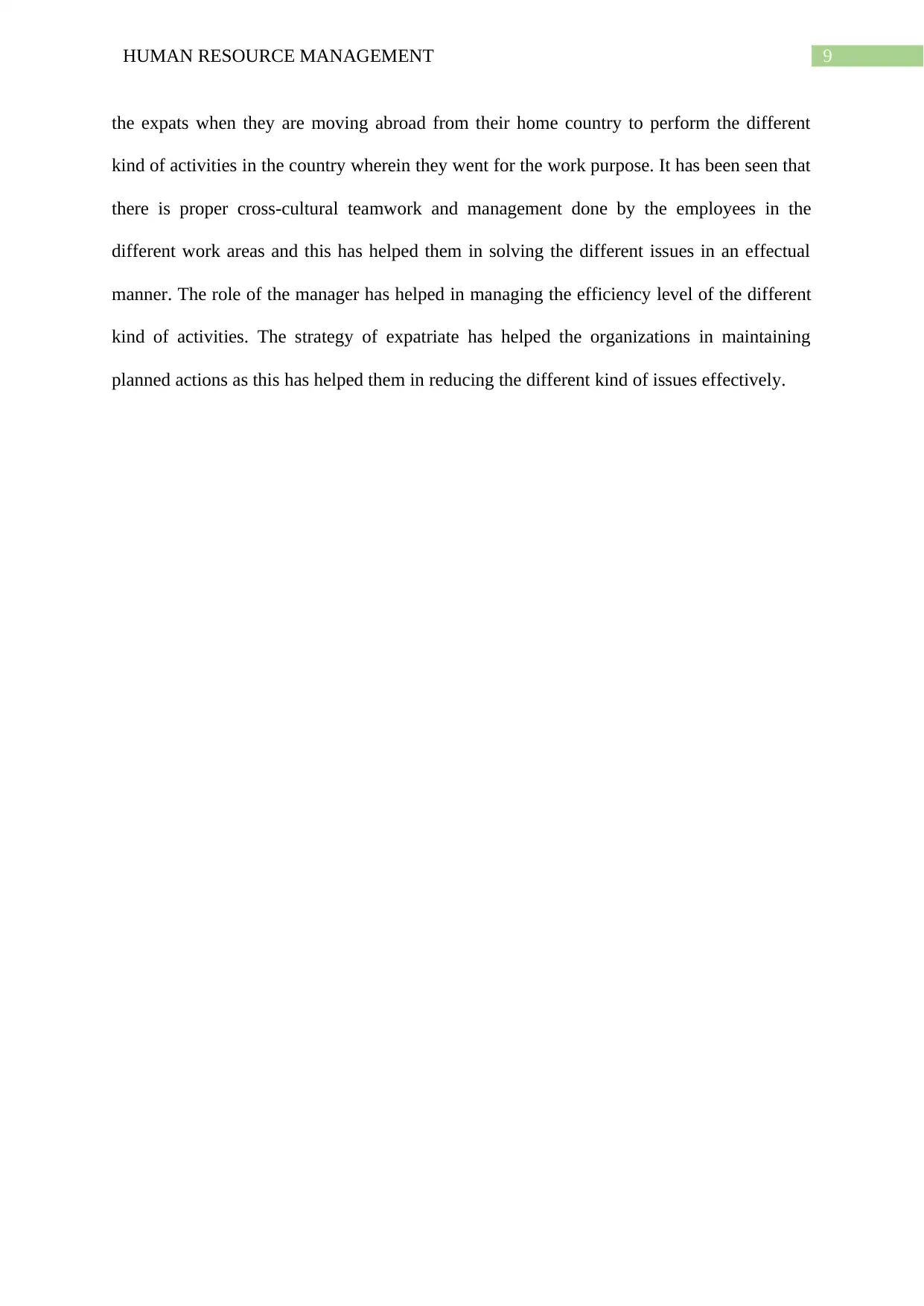
9HUMAN RESOURCE MANAGEMENT
the expats when they are moving abroad from their home country to perform the different
kind of activities in the country wherein they went for the work purpose. It has been seen that
there is proper cross-cultural teamwork and management done by the employees in the
different work areas and this has helped them in solving the different issues in an effectual
manner. The role of the manager has helped in managing the efficiency level of the different
kind of activities. The strategy of expatriate has helped the organizations in maintaining
planned actions as this has helped them in reducing the different kind of issues effectively.
the expats when they are moving abroad from their home country to perform the different
kind of activities in the country wherein they went for the work purpose. It has been seen that
there is proper cross-cultural teamwork and management done by the employees in the
different work areas and this has helped them in solving the different issues in an effectual
manner. The role of the manager has helped in managing the efficiency level of the different
kind of activities. The strategy of expatriate has helped the organizations in maintaining
planned actions as this has helped them in reducing the different kind of issues effectively.
Paraphrase This Document
Need a fresh take? Get an instant paraphrase of this document with our AI Paraphraser
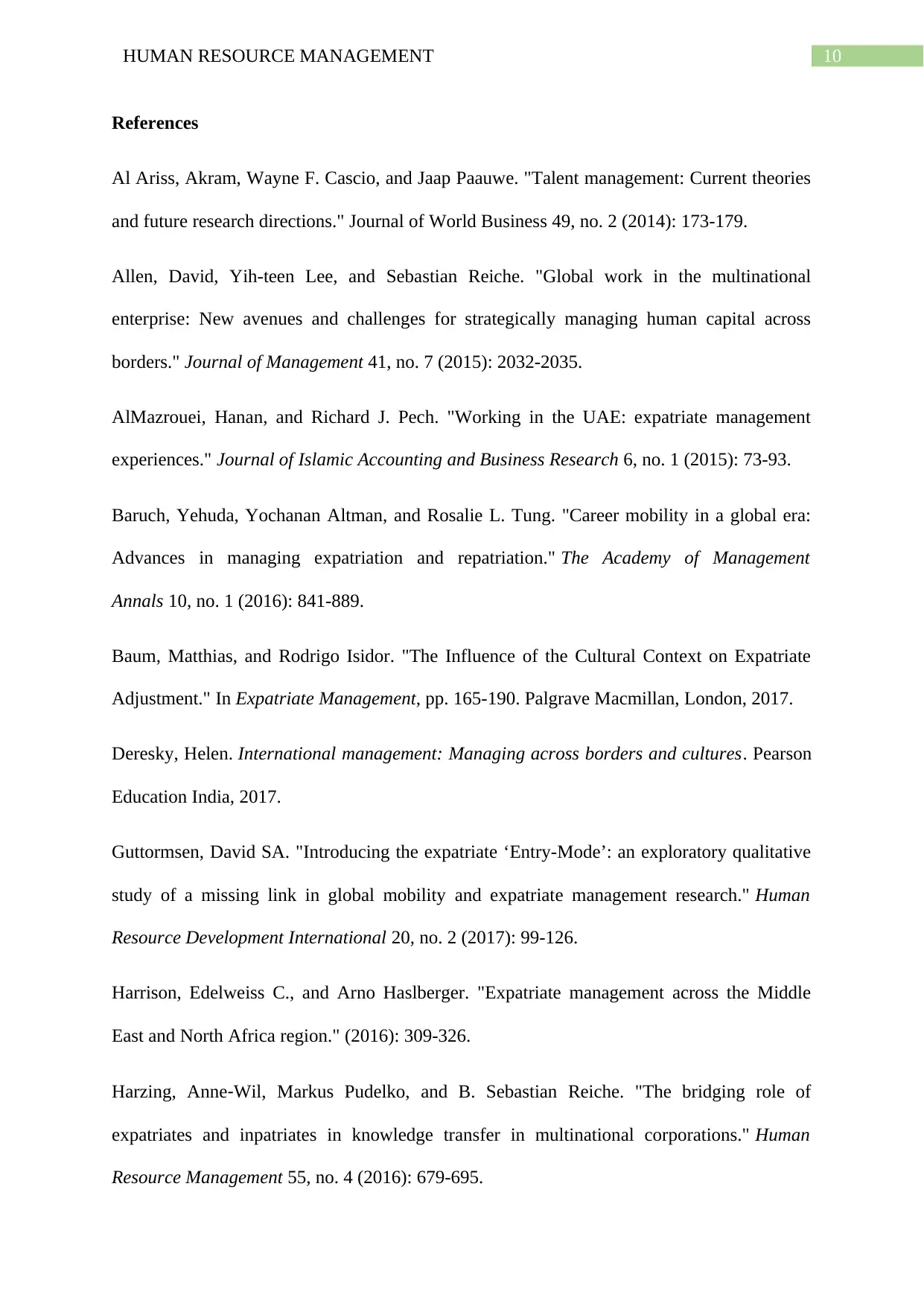
10HUMAN RESOURCE MANAGEMENT
References
Al Ariss, Akram, Wayne F. Cascio, and Jaap Paauwe. "Talent management: Current theories
and future research directions." Journal of World Business 49, no. 2 (2014): 173-179.
Allen, David, Yih-teen Lee, and Sebastian Reiche. "Global work in the multinational
enterprise: New avenues and challenges for strategically managing human capital across
borders." Journal of Management 41, no. 7 (2015): 2032-2035.
AlMazrouei, Hanan, and Richard J. Pech. "Working in the UAE: expatriate management
experiences." Journal of Islamic Accounting and Business Research 6, no. 1 (2015): 73-93.
Baruch, Yehuda, Yochanan Altman, and Rosalie L. Tung. "Career mobility in a global era:
Advances in managing expatriation and repatriation." The Academy of Management
Annals 10, no. 1 (2016): 841-889.
Baum, Matthias, and Rodrigo Isidor. "The Influence of the Cultural Context on Expatriate
Adjustment." In Expatriate Management, pp. 165-190. Palgrave Macmillan, London, 2017.
Deresky, Helen. International management: Managing across borders and cultures. Pearson
Education India, 2017.
Guttormsen, David SA. "Introducing the expatriate ‘Entry-Mode’: an exploratory qualitative
study of a missing link in global mobility and expatriate management research." Human
Resource Development International 20, no. 2 (2017): 99-126.
Harrison, Edelweiss C., and Arno Haslberger. "Expatriate management across the Middle
East and North Africa region." (2016): 309-326.
Harzing, Anne‐Wil, Markus Pudelko, and B. Sebastian Reiche. "The bridging role of
expatriates and inpatriates in knowledge transfer in multinational corporations." Human
Resource Management 55, no. 4 (2016): 679-695.
References
Al Ariss, Akram, Wayne F. Cascio, and Jaap Paauwe. "Talent management: Current theories
and future research directions." Journal of World Business 49, no. 2 (2014): 173-179.
Allen, David, Yih-teen Lee, and Sebastian Reiche. "Global work in the multinational
enterprise: New avenues and challenges for strategically managing human capital across
borders." Journal of Management 41, no. 7 (2015): 2032-2035.
AlMazrouei, Hanan, and Richard J. Pech. "Working in the UAE: expatriate management
experiences." Journal of Islamic Accounting and Business Research 6, no. 1 (2015): 73-93.
Baruch, Yehuda, Yochanan Altman, and Rosalie L. Tung. "Career mobility in a global era:
Advances in managing expatriation and repatriation." The Academy of Management
Annals 10, no. 1 (2016): 841-889.
Baum, Matthias, and Rodrigo Isidor. "The Influence of the Cultural Context on Expatriate
Adjustment." In Expatriate Management, pp. 165-190. Palgrave Macmillan, London, 2017.
Deresky, Helen. International management: Managing across borders and cultures. Pearson
Education India, 2017.
Guttormsen, David SA. "Introducing the expatriate ‘Entry-Mode’: an exploratory qualitative
study of a missing link in global mobility and expatriate management research." Human
Resource Development International 20, no. 2 (2017): 99-126.
Harrison, Edelweiss C., and Arno Haslberger. "Expatriate management across the Middle
East and North Africa region." (2016): 309-326.
Harzing, Anne‐Wil, Markus Pudelko, and B. Sebastian Reiche. "The bridging role of
expatriates and inpatriates in knowledge transfer in multinational corporations." Human
Resource Management 55, no. 4 (2016): 679-695.
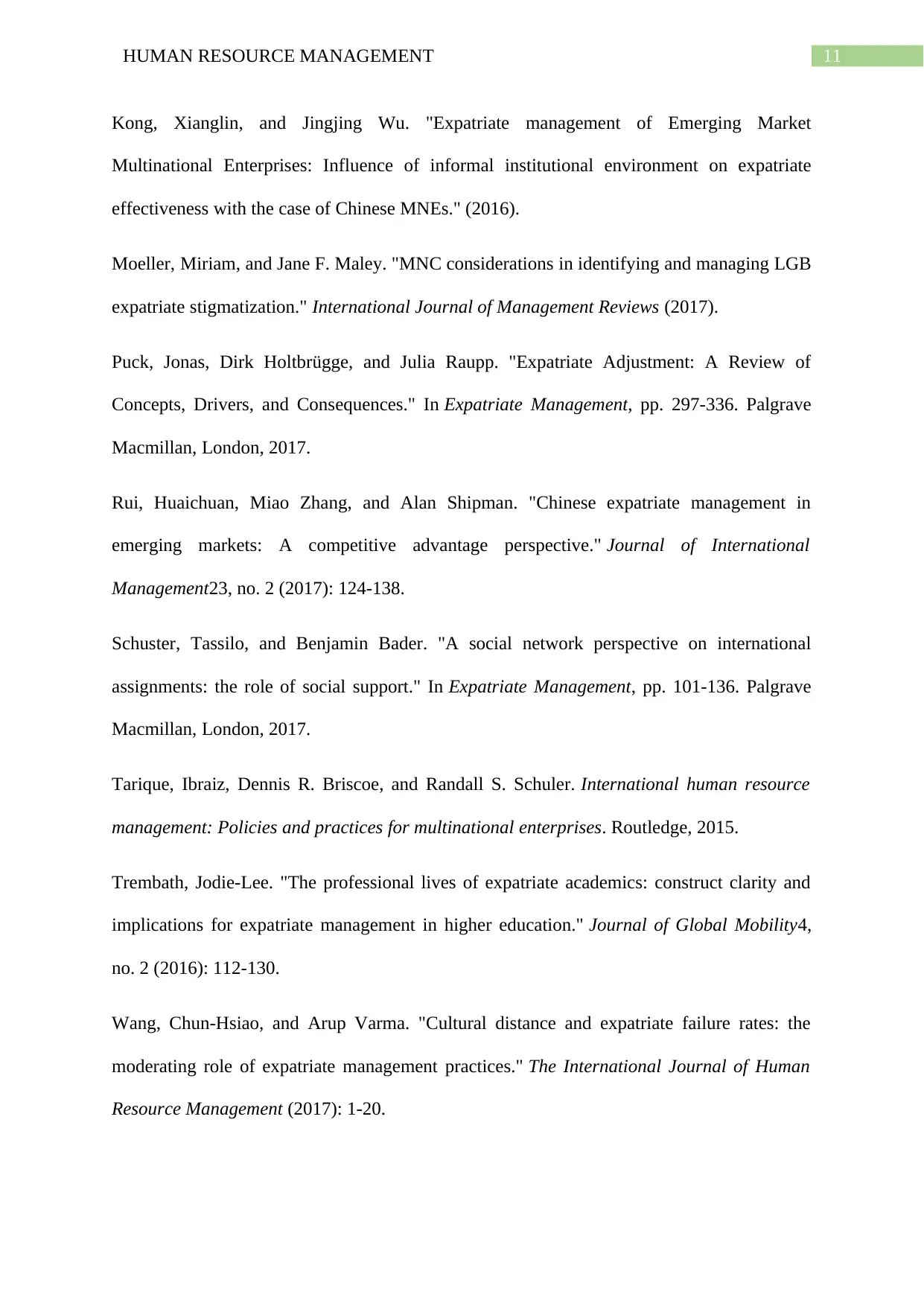
11HUMAN RESOURCE MANAGEMENT
Kong, Xianglin, and Jingjing Wu. "Expatriate management of Emerging Market
Multinational Enterprises: Influence of informal institutional environment on expatriate
effectiveness with the case of Chinese MNEs." (2016).
Moeller, Miriam, and Jane F. Maley. "MNC considerations in identifying and managing LGB
expatriate stigmatization." International Journal of Management Reviews (2017).
Puck, Jonas, Dirk Holtbrügge, and Julia Raupp. "Expatriate Adjustment: A Review of
Concepts, Drivers, and Consequences." In Expatriate Management, pp. 297-336. Palgrave
Macmillan, London, 2017.
Rui, Huaichuan, Miao Zhang, and Alan Shipman. "Chinese expatriate management in
emerging markets: A competitive advantage perspective." Journal of International
Management23, no. 2 (2017): 124-138.
Schuster, Tassilo, and Benjamin Bader. "A social network perspective on international
assignments: the role of social support." In Expatriate Management, pp. 101-136. Palgrave
Macmillan, London, 2017.
Tarique, Ibraiz, Dennis R. Briscoe, and Randall S. Schuler. International human resource
management: Policies and practices for multinational enterprises. Routledge, 2015.
Trembath, Jodie-Lee. "The professional lives of expatriate academics: construct clarity and
implications for expatriate management in higher education." Journal of Global Mobility4,
no. 2 (2016): 112-130.
Wang, Chun-Hsiao, and Arup Varma. "Cultural distance and expatriate failure rates: the
moderating role of expatriate management practices." The International Journal of Human
Resource Management (2017): 1-20.
Kong, Xianglin, and Jingjing Wu. "Expatriate management of Emerging Market
Multinational Enterprises: Influence of informal institutional environment on expatriate
effectiveness with the case of Chinese MNEs." (2016).
Moeller, Miriam, and Jane F. Maley. "MNC considerations in identifying and managing LGB
expatriate stigmatization." International Journal of Management Reviews (2017).
Puck, Jonas, Dirk Holtbrügge, and Julia Raupp. "Expatriate Adjustment: A Review of
Concepts, Drivers, and Consequences." In Expatriate Management, pp. 297-336. Palgrave
Macmillan, London, 2017.
Rui, Huaichuan, Miao Zhang, and Alan Shipman. "Chinese expatriate management in
emerging markets: A competitive advantage perspective." Journal of International
Management23, no. 2 (2017): 124-138.
Schuster, Tassilo, and Benjamin Bader. "A social network perspective on international
assignments: the role of social support." In Expatriate Management, pp. 101-136. Palgrave
Macmillan, London, 2017.
Tarique, Ibraiz, Dennis R. Briscoe, and Randall S. Schuler. International human resource
management: Policies and practices for multinational enterprises. Routledge, 2015.
Trembath, Jodie-Lee. "The professional lives of expatriate academics: construct clarity and
implications for expatriate management in higher education." Journal of Global Mobility4,
no. 2 (2016): 112-130.
Wang, Chun-Hsiao, and Arup Varma. "Cultural distance and expatriate failure rates: the
moderating role of expatriate management practices." The International Journal of Human
Resource Management (2017): 1-20.
⊘ This is a preview!⊘
Do you want full access?
Subscribe today to unlock all pages.

Trusted by 1+ million students worldwide
1 out of 13
Related Documents
Your All-in-One AI-Powered Toolkit for Academic Success.
+13062052269
info@desklib.com
Available 24*7 on WhatsApp / Email
![[object Object]](/_next/static/media/star-bottom.7253800d.svg)
Unlock your academic potential
Copyright © 2020–2025 A2Z Services. All Rights Reserved. Developed and managed by ZUCOL.




